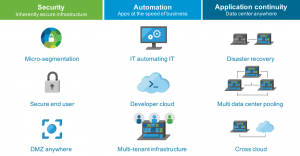CoreOS Adds Kubernetes 1.7, Azure Support to Tectonic Platform
 The company hints at plans to add Google Cloud platform into the mix.
The company hints at plans to add Google Cloud platform into the mix.
BGP Route Reflector routing loop problem !
BGP Route reflector routing loop arise in IP networks. In this post, I will illustrate the topology which will loop the IP packets between the routers and I will describe multiple possible solution and share a best practice to design BGP Route Reflector in an IP network. BGP Route Reflector Routing loop […]
The post BGP Route Reflector routing loop problem ! appeared first on Cisco Network Design and Architecture | CCDE Bootcamp | orhanergun.net.
BYOD Policy Configuration in Cisco ISE
See how to set policies in Identity Services Engine for personal mobile devices on the network.
BGP LLDP Peer Discovery
Just like with the other routing protocols such as OSPF or EIGRP, BGP speaking routers first need to become neighbors prior to
The post BGP LLDP Peer Discovery appeared first on Noction.
Game of Thrones, Network Manager Edition
The popular TV show provides seven lessons for those who work to maintain the network.
BGP Peer Groups
Sometimes we have a network where we really want to deploy the same kind of the configuration with the same policies and we can achieve in two different ways. One is to configure all the router one by one manually and it is a time consuming task. The other way to define the same set of the configurations and the policies is to set up with the peer groups in the BGP. So if there are 4 routers and we want to have these routers with same kind of configurations and the policies we can set all of them in a peer group.
So with the above explained definition hope you guys understand the concept of the peer group. Now we are going to talk about the configuration with the help of the topology. The Topology and the IP used in this article is for demo purposes and has no relevance Continue reading
Ansible Overview
Ansible is a 'radically simple', open source, IT automation platform. Architecture Control Node The Ansible control node is the central point of management for managed nodes. Configuration is pushed to the managed nodes from the control node. Managed Node A managed node...continue reading
Why We Terminated Daily Stormer
Earlier today, Cloudflare terminated the account of the Daily Stormer. We've stopped proxying their traffic and stopped answering DNS requests for their sites. We've taken measures to ensure that they cannot sign up for Cloudflare's services ever again.
Our terms of service reserve the right for us to terminate users of our network at our sole discretion. The tipping point for us making this decision was that the team behind Daily Stormer made the claim that we were secretly supporters of their ideology.
Our team has been thorough and have had thoughtful discussions for years about what the right policy was on censoring. Like a lot of people, we’ve felt angry at these hateful people for a long time but we have followed the law and remained content neutral as a network. We could not remain neutral after these claims of secret support by Cloudflare.
Now, having made that decision, let me explain why it's so dangerous.
Where Do You Regulate Content on the Internet?
There are a number of different organizations that work in concert to bring you the Internet. They include:
- Content creators, who author the actual content online.
- Platforms (e.g., Facebook, Wordpress, etc.), where Continue reading
NSX Sessions for the Geeks at VMworld 2017
This year at VMworld 2017 we have a great agenda full of highly technical sessions around NSX. Over the past few years NSX has expanded to meet a variety of use cases as our Content Catalog clearly shows. Based on the project your working on today, check out our recommendations for the best technical sessions for these specific NSX use cases:
- General overview sessions
- Security
- NSX & Cloud Native Apps
- Application Continuity
- Automation
- Design & Architecture

General NSX Sessions:
TS7003KU: Transforming Networking and Security for the Digital Era
Speakers: Milin Desai, Tom Corn and 3 customers
At a time when changes to technology are coming at us at a fast pace, how do customers meet and exceed business expectations? This session will focus on how customers are on their SDDC journey in context of network and security. Through the lens of the customer we will share what drives adoption, technology updates, team dynamics and becoming part of the overall business success.
NET3282BU: The NSX Practical Path
Speakers: Nikhil Kelshikar, Ron Fuller
We will share how customers have found value with NSX by getting started with one of the use cases around Security, Automation or App continuity. We will show Continue reading
IS-IS Case Study – Ausnet
This is a case study which provides a detailed design steps for IGP protocol on hypothetical Internet Service Provider, called Ausnet. You can download the Case Study as PDF format from the below link by providing your name and email address.
The post IS-IS Case Study – Ausnet appeared first on Cisco Network Design and Architecture | CCDE Bootcamp | orhanergun.net.
Worth Reading: The shape of HPC and AI iron to come
The post Worth Reading: The shape of HPC and AI iron to come appeared first on rule 11 reader.
PCAP PCAP PCAP – Changes to RJ Store
 I made a couple changes to the RouterJockey store this week and I wanted to make sure I got the word out. Previously the store worked in sprints that I tried to open up 2-3x a year. Instead of trying to manage these sprints, and keep the products updated, I’ve now made the store available year round. It still operates in sprints, but instead of being 2-3 weeks long, they’re only 3-4 days each.
I made a couple changes to the RouterJockey store this week and I wanted to make sure I got the word out. Previously the store worked in sprints that I tried to open up 2-3x a year. Instead of trying to manage these sprints, and keep the products updated, I’ve now made the store available year round. It still operates in sprints, but instead of being 2-3 weeks long, they’re only 3-4 days each.
On top of being more available, the store now has a few new products, nothing too exciting, but we do have a RJ phone case, a PCAP mug, and a couple stickers for sale. Teespring has recently added these products and as I get requests for other products I will be sure to add them. As usual, if you have any questions, hit me up on twitter or use the contact form.
Click here, or use the store item in the menu bar to visit my new storefront.
The post PCAP PCAP PCAP – Changes to RJ Store appeared first on Router Jockey.
Docker Adds IBM Mainframes, Enhanced Security Support to EE
 Broader system support, security, and automation are added to EE tiers.
Broader system support, security, and automation are added to EE tiers.